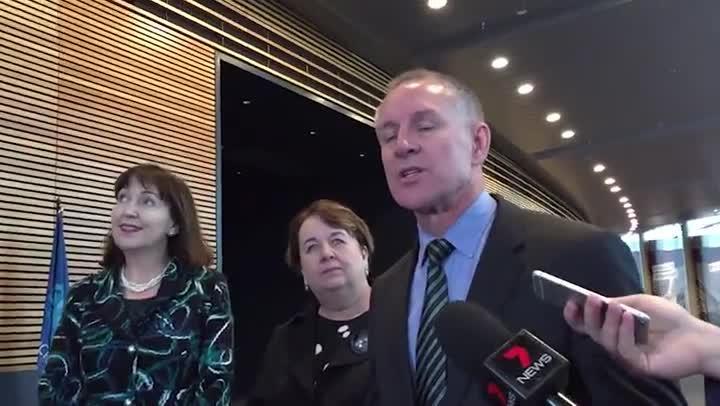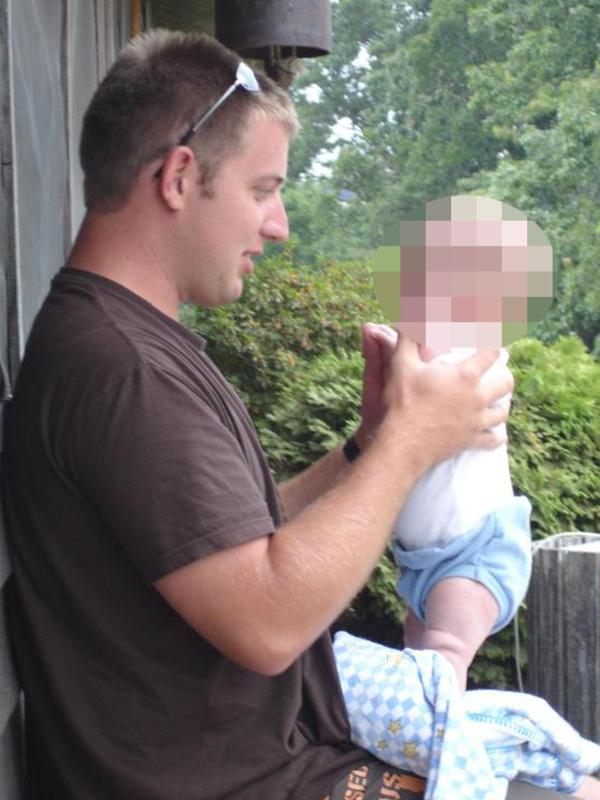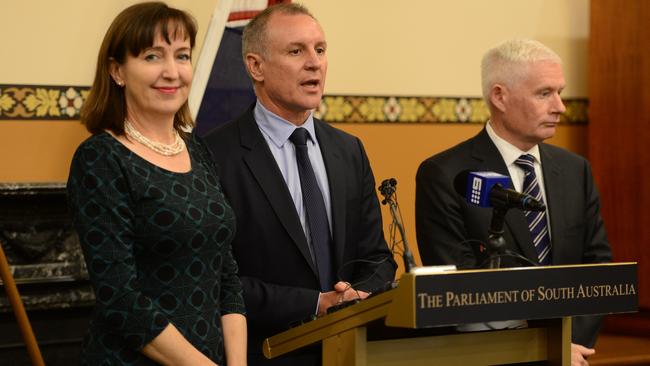South Australian Government accepts 196 recommendations from Nyland Royal Commission into child protection
NEW ways to report suspected abuse and neglect of children, funding to better train social workers and stricter monitoring of carers are the centrepieces of the State Government’s full response to the Nyland Royal Commission.

- Extra $232m for system that failed our kids
- 100 education workers with lapsed police clearances
- Nyland report: 260 recommendations for SA child protection system
- Three agencies respond to the Nyland report
- Another Families SA scandal, another review
NEW ways to report suspected abuse and neglect of children, funding to better train social workers and stricter monitoring of carers are the centrepieces of the State Government’s full response to the Nyland Royal Commission.
Premier Jay Weatherill has promised the new Child Protection Department will focus on early support for at-risk families and take action based on the best evidence in the field.
He announced on Tuesday the Government has accepted 196 of Royal Commissioner Margaret Nyland’s 260 recommendations to reform the state’s child protection system.
It has agreed to a further 60 recommendations in principle but has ruled out four.

The royal commission was prompted by the crimes of former government carer and convicted paedophile Shannon McCoole.
As reported by The Advertiser, the Government committed an extra $232 million to implementing Ms Nyland’s recommendations — in addition to $200 million initially pledged when she delivered her report in early August.
“The task of reform ahead is significant,” Mr Weatherill said.
However, he was “very confident” that authorities could meet the targets outlined in the Nyland blueprint.
A key measure will be a trial of a new Child Safety Pathway to bring together other government agencies — such as health, housing or education — to help the Child Protection Department to assess reports of suspected abuse or neglect made to its call centre.
The trial is expected to begin by mid next year and will boost the number of staff answering calls to the overstretched hotline.

The Government response also includes:
THREE pilot sites for new child and family assessment and referral networks.
$10 million to better train child protection staff.
$11 million to establish a protective intervention backlog team to improve and fast-track early help for at-risk families and to reunite families earlier where possible.
$13 million to improve the Child Abuse Report Line
$299 million for additional staff, resources and new initiatives in out of home care
$45 million for early intervention programs
$26 million to improve investigations and responses to cases
$6 million to establish the Office of the Commissioner for Children and Young People
$6 million to establish a Child Protection Service at the Lyell McEwin Hospital
$10.8 million to support young people leaving state care
Child Protection Reform Minister John Rau has also released draft new laws to replace the Children’s Protection Act, passed in 1993.
Parliament is expected to debate the Children and Young People (Safety) Bill when it returns after the summer break.
The Government will deliver its next progress report on implementing the Nyland recommendations in June, 2017.
In response to the announcement, Opposition Leader Steven Marshall condemned the Government as “lazy” and “incapable” of improving the system.
Mr Marshall said the Premier had promised “fundamental culture change” in child protection as far back as 2004 but had failed to deliver.
“They’ve had chance after chance ... recommendations, hundreds of them, over the years,” he said.
“This Government has had 14½ years to deal with these various problems with the child protection system in this state.
“The only way that we are going to fix child protection in South Australia is to change the government.”
Welfare and non-government organisations largely welcomed the plan for the future but wanted time to consider the detail of the legislation, which will give their sector a greater role in child protection.
SA Council of Social Service CEO Ross Womersley said while the response was comprehensive there remained topics “around which we need to have some brave conversations”.
“For example we should contemplate whether mandatory reporting really helps to prevent child abuse or whether it redirects resources that could be used more effectively,” he said.
Centacare Catholic Family Services director Dale West was “encouraged” by a long-term focus on early intervention but urged authorities not to forget about children who are now in great danger.
“We need to draw a line for children who are being born today so that they go into a system that doesn’t repeat the tragedies we have unfortunately experienced in recent years,” he said.
“You can’t just say ‘prevent and forget about the rest’, because they are tomorrow’s parents.”
Anglicare CEO Peter Sandeman hoped the Government’s response signalled a “rebirth” of the child protection system.
He welcomed changes that would better include other parties — such as non-government organisations, parents, foster carers and other government agencies — in protecting children.
“We should all be held to account but in the past, this hasn’t always been the case,” he said.
“We would support a new network where less urgent notifications (of suspected abuse or neglect) that don’t require an immediate response would be managed and responded to by this network and overseen by a non-government organisation. However, (this) warrants more discussion.”
Foster carer spokeswoman Rachel Titley said a number of changes accepted by the Government — including more legal recognition for carers, avenues to appeal decisions by child protection authorities and more information about the background of children — would encourage more people to consider taking a child into their homes.
“These provisions can give potential and new foster carers peace of mind that the care that they provide is recognised and important,” she said.
Ms Ttitley said the outcome of a review of payments to foster carers “can’t come soon enough”.
Foster carers are currently paid an average of about $10,000 a year, she said.
Analysis — Little goodwill left in the community
IT is meant to be a fresh start, but already some of the same old mistakes are being made.
Premier Jay Weatherill yesterday delivered his Government’s response to the royal commission sparked by the heinous crimes of former government carer and convicted paedophile Shannon McCoole.
However, it seems no one from Government reached out to tell the parents of children abused by McCoole.
The father of one of those children yesterday told The Advertiser of his surprise and disappointment that his family was not given a heads up before the Government publicly outlined its plans to fix the system that so badly let down his son.
Mr Weatherill and his ministers have repeatedly promised to be more transparent when it comes to child protection — and, at times, have delivered on that promise.
They held a briefing with non-government welfare organisations yesterday morning ahead of the announcement. Later, Mr Weatherill apologised in State Parliament to those who had been let down by this dysfunctional system.
He previously met with the parents of McCoole’s victims and they were briefed before Ms Nyland’s report was delivered in August.
But it is a clear oversight not to have spoken to the families directly affected by this case ahead of outlining the complete overhaul it prompted yesterday.
There is precious little goodwill left in the community for a Government that has had repeated chances to get this right. Most welcomed a plan for the future yesterday, and understand that change will take time.
But there remains scepticism about whether the blueprint can be realistically achieved.
At the heart of the promised changes is a pledge to put the interests of children first as we move forward.
It begs the obvious question — why was this not happening before?
As the father of one of McCoole’s young victims put it: “Can you please start thinking of the children, for crying out loud”.
- Lauren Novak
Child protection timeline
The Layton Report — March, 2003
THE 400-page Child Protection Review by prominent QC Robyn Layton was handed down in March, 2003 after a nine-month investigation.
On releasing the Government’s response to the Layton report, then Families and Communities Minister Jay Weatherill said there was a need for a fundamental culture change and a new sense of direction within the department.
Mullighan Inquiry — April, 2008
RETIRED Supreme Court Justice Ted Mullighan, QC, was given the responsibility to inquire into any allegation of sexual abuse of a person in state care, whether or not any allegation was previously made or reported in 2004.
This ran parallel to another inquiry by Commissioner Mullighan into children on the APY Lands, which was established in June, 2007. The two reports were delivered in April, 2008.
Parliamentary Select Committee on Families SA — November, 2009
OVER two years, the Select Committee received 92 written secret submissions and heard evidence from 38 witnesses, including department whistleblowers.
The committee’s report, delivered in November, 2009, revealed a catalogue of failures, evidence of some officers engaging in cover-ups and concluded the agency was in “crisis”.
The Government rejected six findings and voiced concerns over its “serious shortcomings”.
Debelle Inquiry — July, 2013
THE independent Education Inquiry was launched after it was revealed in State Parliament, in November, 2012, that parents at a western suburbs school were kept in the dark for two years that an out-of-school-hours-care worker, Mark Christopher Harvey, had raped a seven-year-old girl.
On July 1, 2013, Mr Debelle handed down a 280-page report which the Education Department chief executive at the time, Keith Bartley, labelled a “sobering chronicle of failures at every level within the department’’.
Inquest into the death of Chloe Valentine — April, 2015
State Coroner Mark Johns held an inquiry into the 2012 death of four-year-old Chloe Valentine, who had been the subject of more than 20 reports to Families SA.
Mr Johns made 21 recommendations stemming from Chloe’s death from injuries she suffered while being forced to ride a motorbike by her mother, Ashlee Polkinghorne, and her mother’s then partner, Ben McPartland. Parliament has since passed a raft of legal changes to act on the recommendations.
Sentencing of Shannon McCoole — August, 2015
Former government carer Shannon McCoole was sentenced on August 7 last year for the vile sexual abuse of seven young children in his care. District Court Judge Paul Rice handed down a 35-year jail sentence with a non-parole period of 28 years.
Authorities revealed in July, 2014 that McCoole had been arrested following a police investigation which also brought down a global online paedophile ring he ran.
Nyland Royal Commission — August, 2016
The State Government commissioned former Supreme Court Justice Margaret Nyland to conduct an inquiry into the state’s child protection system following the 2014 revelations about McCoole’s crimes. She began taking evidence and holding hearings in October, 2015.
In June, 2016, Ms Nyland released interim recommendations to separate the former child protection agency Families SA from the Education and Child Development Department and to hire a new chief executive with qualifications in the field.
She delivered her final report on August 5, 2015, and the Government on Tuesday outlined its full response.
The Nyland Royal Commission
ROYAL Commissioner Margaret Nyland made 260 recommendations to reform the state’s child protection system. The State Government’s response shows it:
ACCEPTS 196 recommendations.
ACCEPTS 60 recommendations in part or says more investigation is needed.
REJECTS 4 recommendations.
HAS completed required action on 21 recommendations, mostly through passing new laws in Parliament to establish a Children’s Commissioner and to tighten background screening checks.
The Government has also moved to establish a new Child Protection Department (formerly Families SA) and hire a new chief executive with expertise in the field.
KEY ACCEPTED RECOMMENDATIONS
ESTABLISH a new Child Safety Pathway to bring together other government agencies — such as health, education, housing and corrections — to help the Child Protection Department assess reports of suspected abuse or neglect made to its call centre.
SET UP a research unit to focus on the best ways to intervene early.
IMPROVE training for child protection staff ($10 million allocated).
PILOT three new child and family assessment and referral network sites, in northern, southern and central Adelaide, which will help connect parents and children with support services.
FUND a Family Scoping Unit to increase the number of children who can be placed with extended family members, instead of with paid carers.
PROVIDE more information to foster carers about the history of children coming into their homes.
OPEN a child protection service at the Lyell McEwin Hospital (costing an initial $6m).
EXTEND payments to foster carers so they can continue to support young people up to the age of 25.
REMOVE children from unsafe homes more quickly — within six to 12 months — where it is clear they are at risk.
GIVE the Child Protection Department chief executive the power to make parents undergo drug and alcohol assessments.
DESIGN and run a Community Visitor Scheme to check on children living in state care.
ALLOW people to make reports about concerns they may have for unborn children.
ESTABLISH a Children’s Commissioner’s office (costing an initial $6 million).
REJECTED RECOMMENDATIONS
The Government will not:
EMPLOY administrative assistants to support caseworkers to enter data into the department’s computer records system, arguing it will create double handling.
APPOINT clinical managers in hub offices to ensure decisions are made by “appropriately qualified staff”, and will instead review the role of principal social workers to ensure they are performing that function.
OUTSOURCE the assessment and support of carers who are relatives of children in care to non-government organisations, arguing this is not supported by the community.
REVIEW the criteria used to screen reports made to the Child Abuse Report Line call centre, arguing better training for staff will result in improved assessments.
